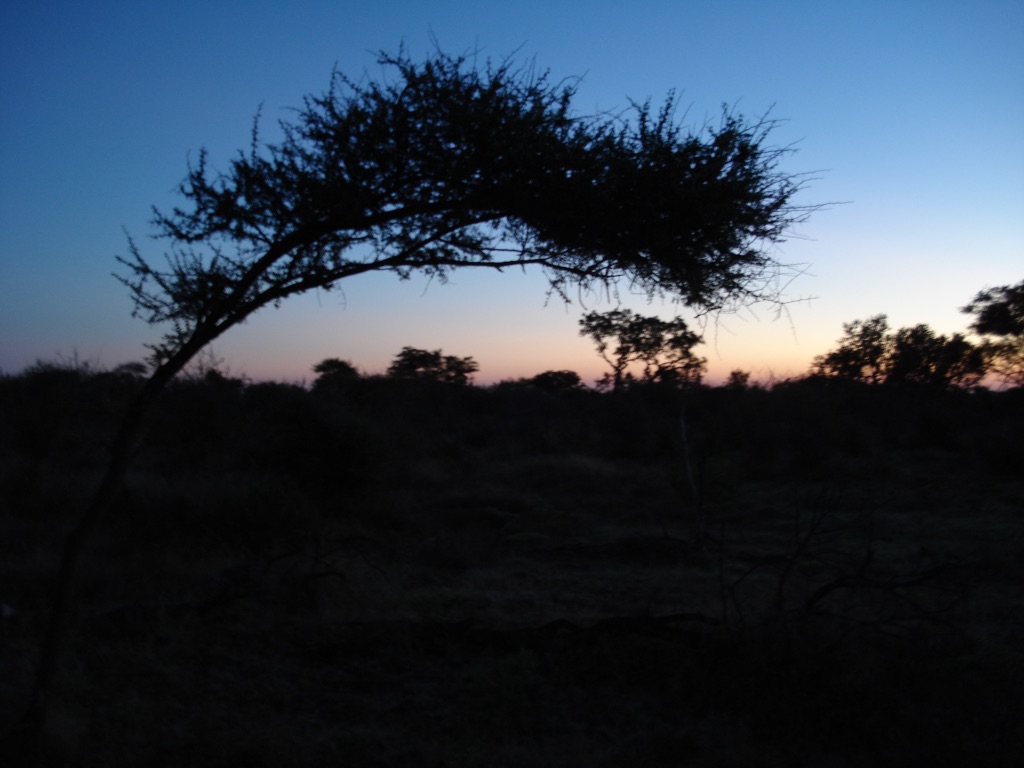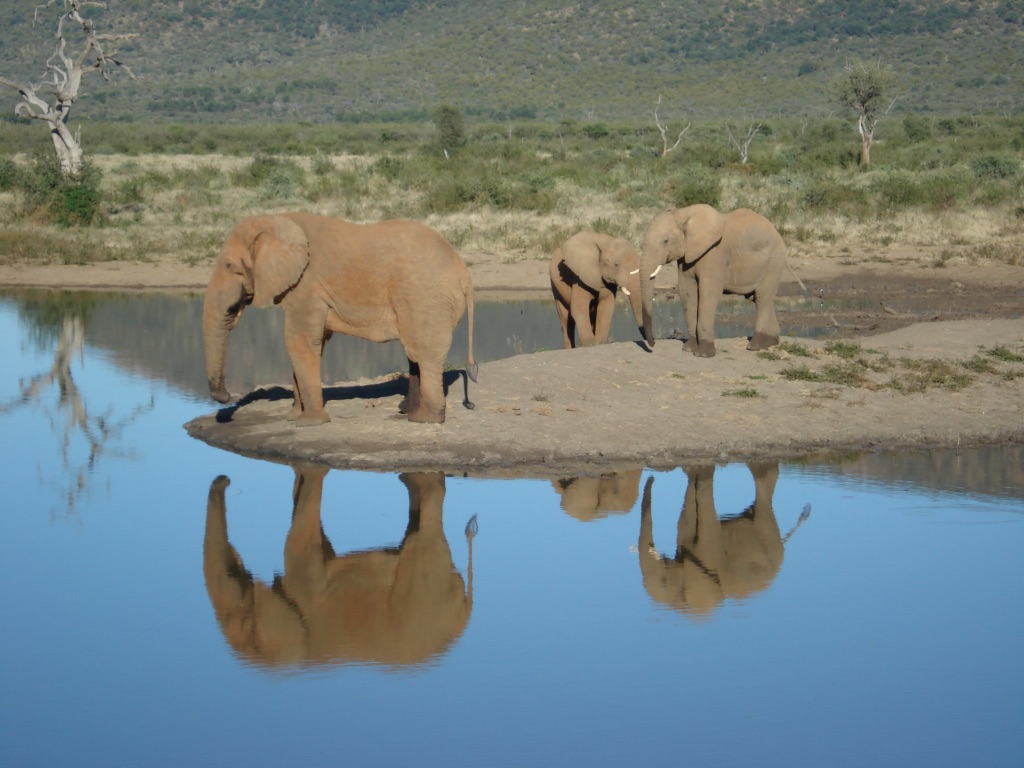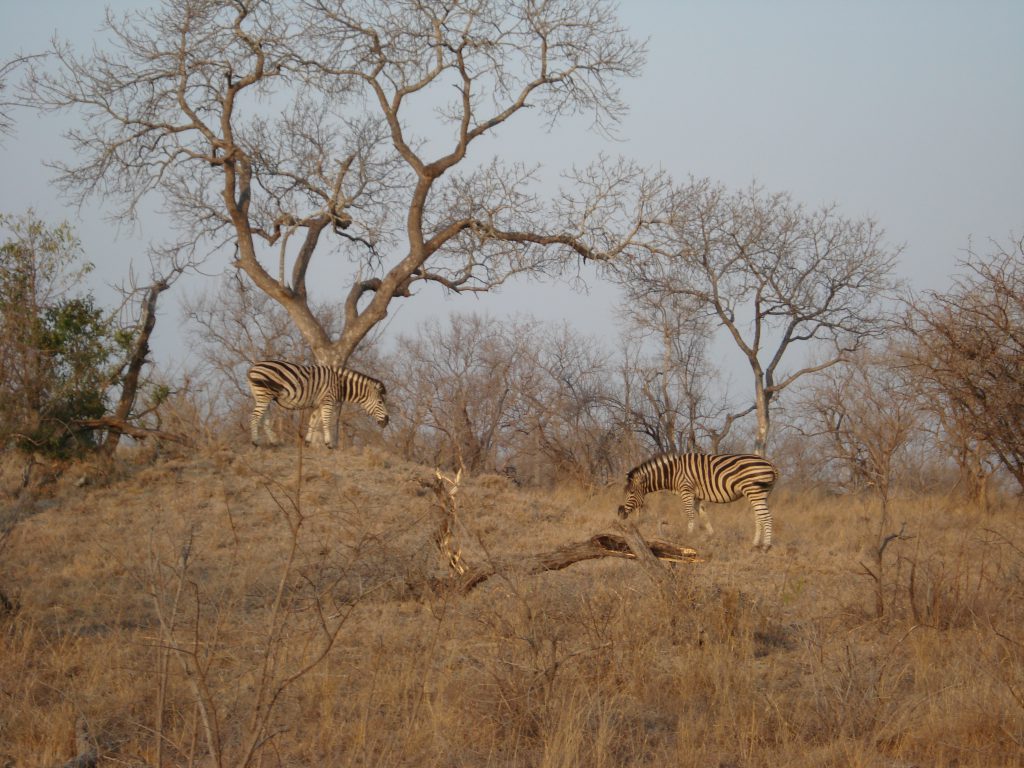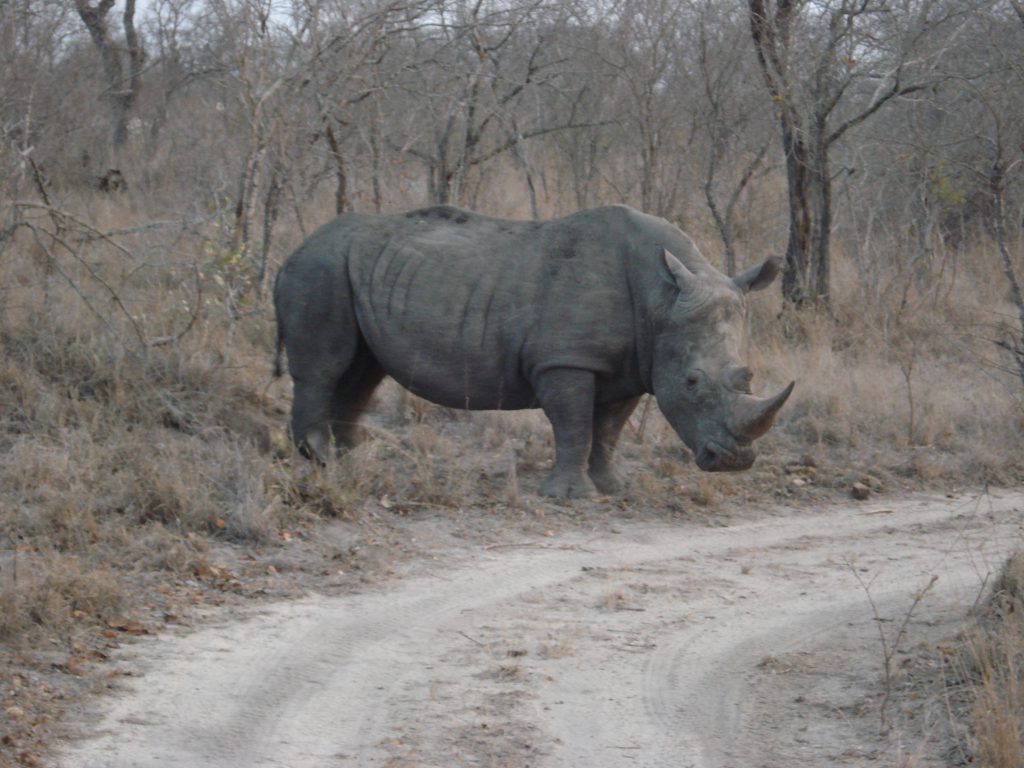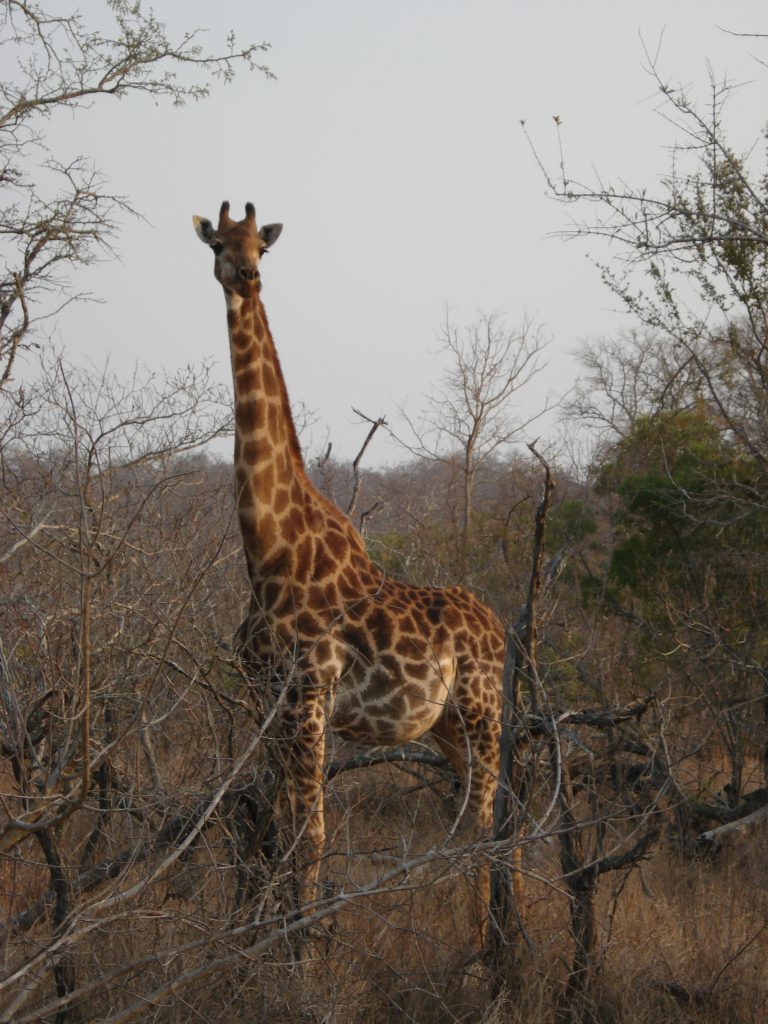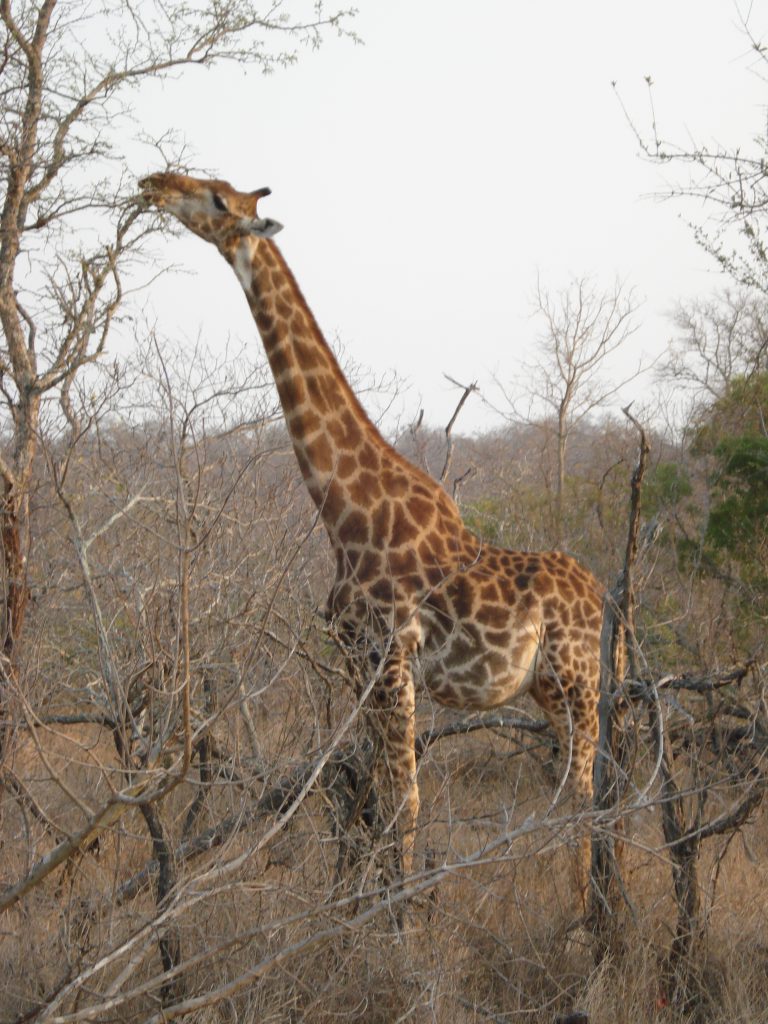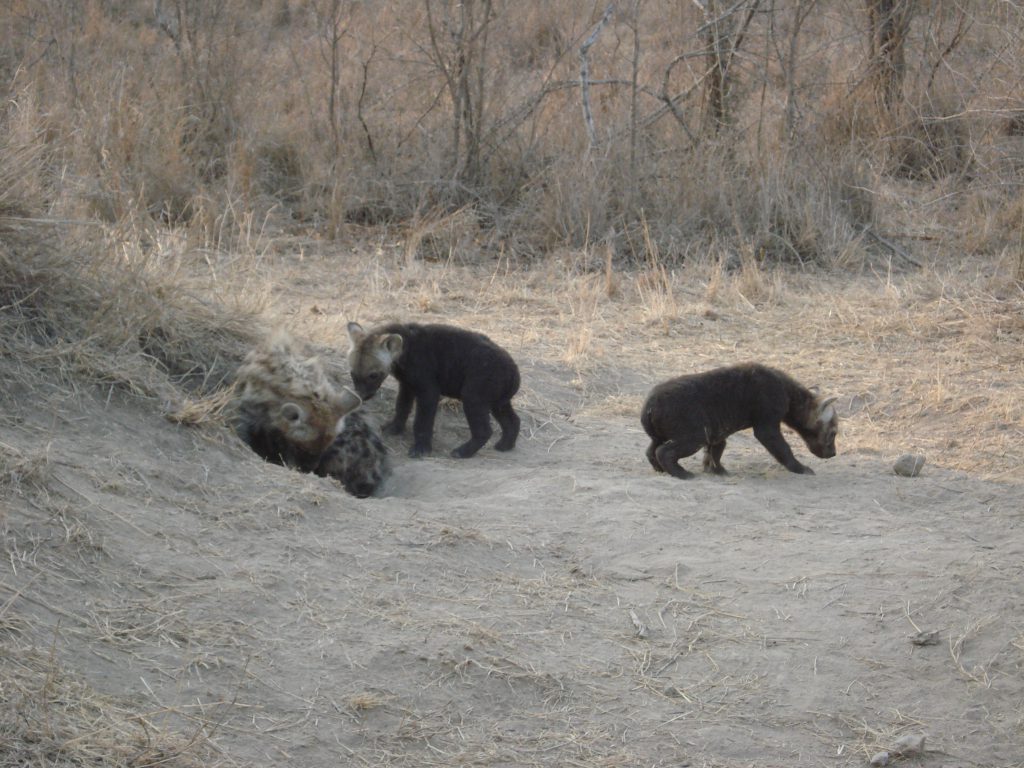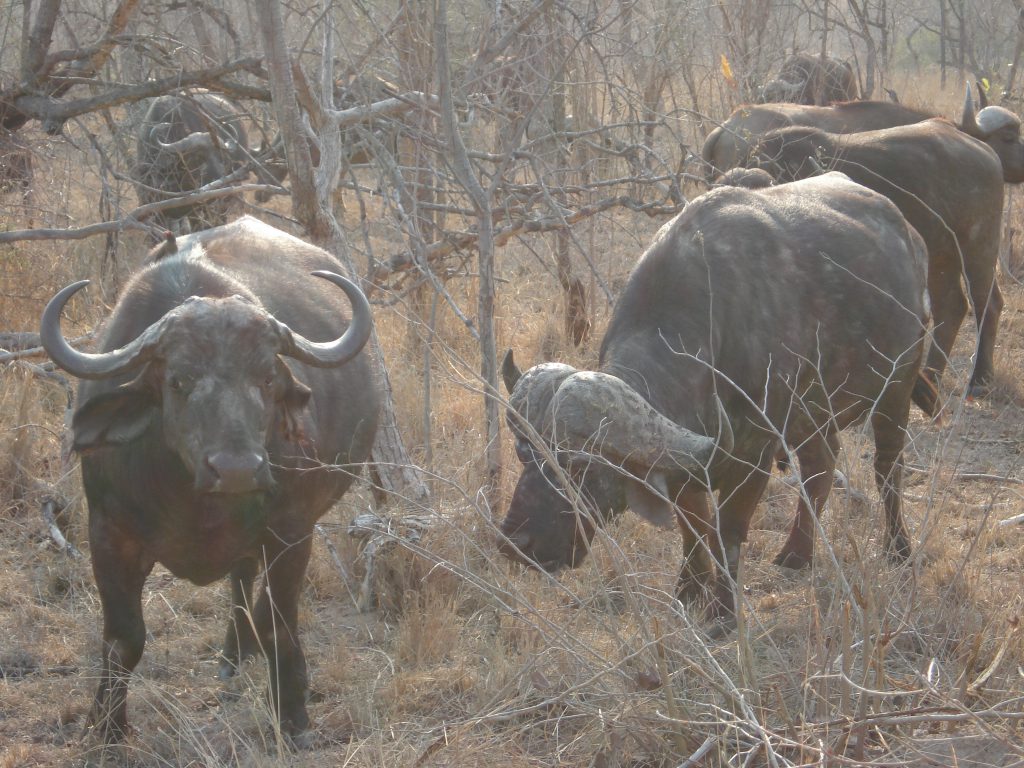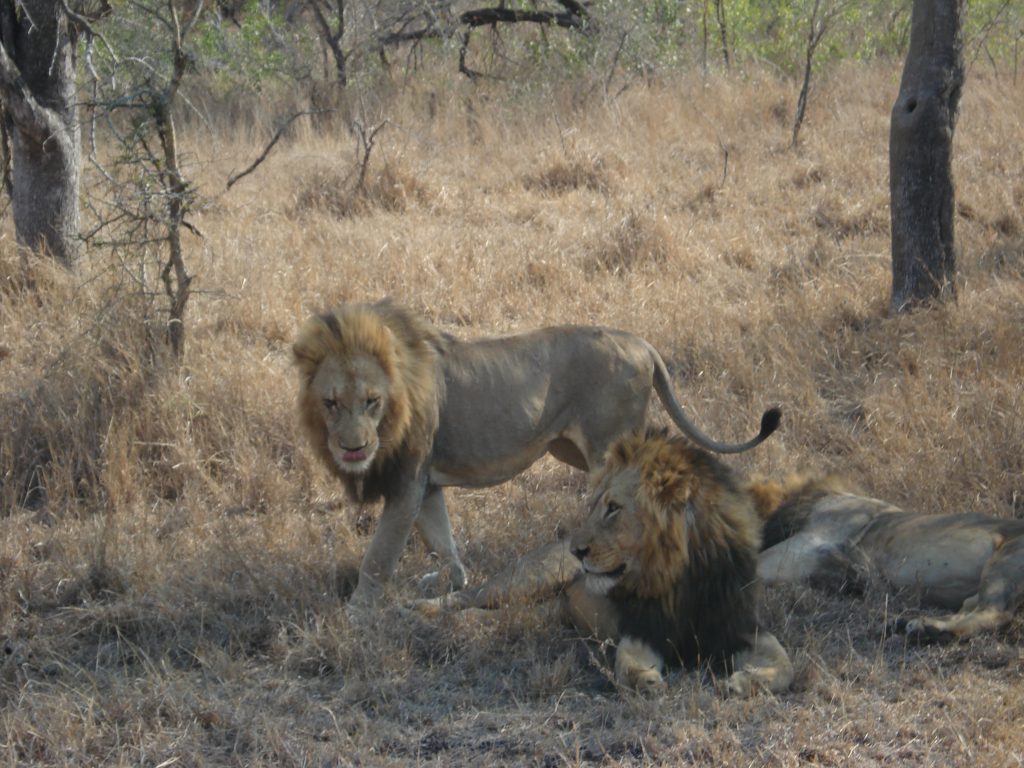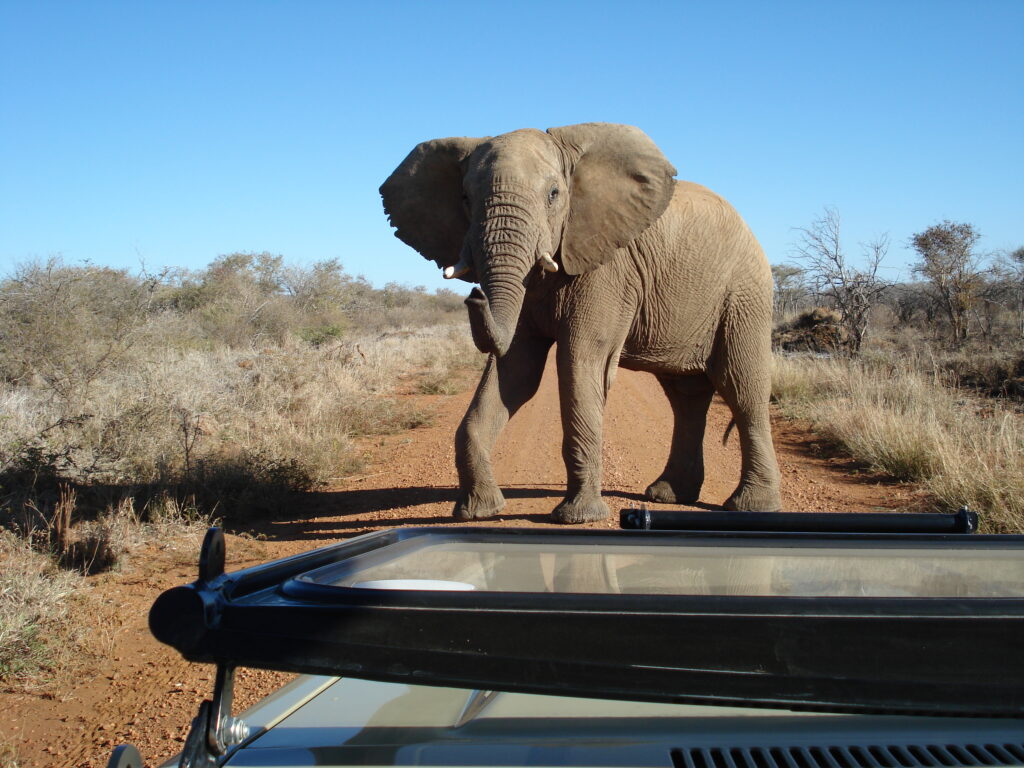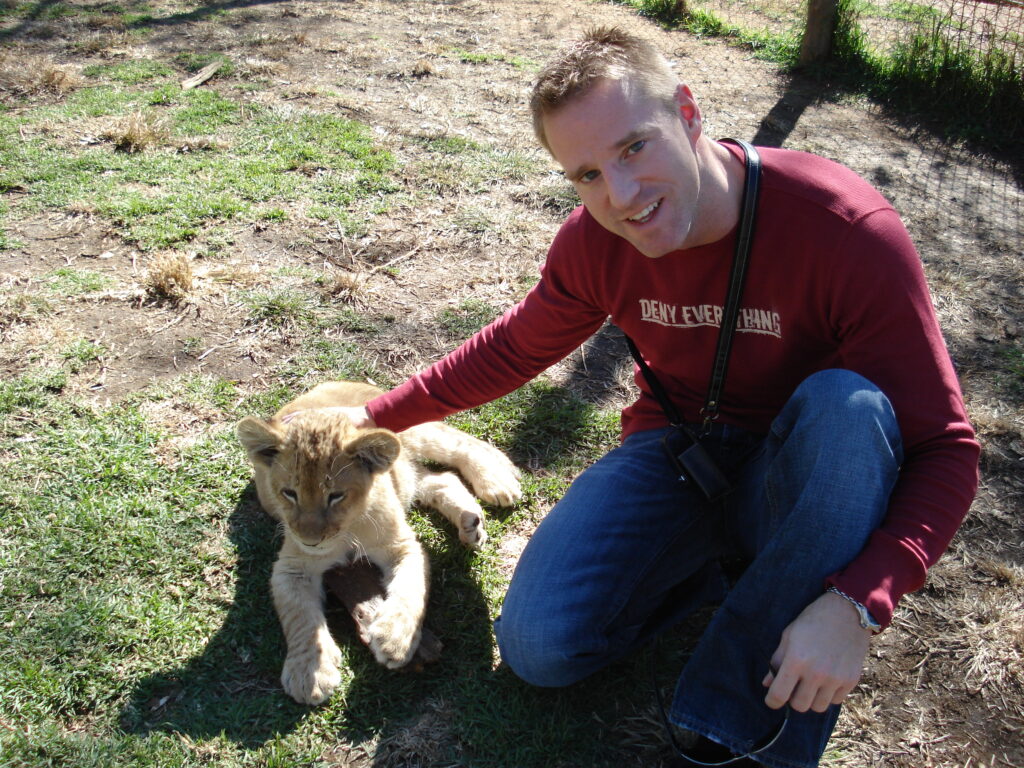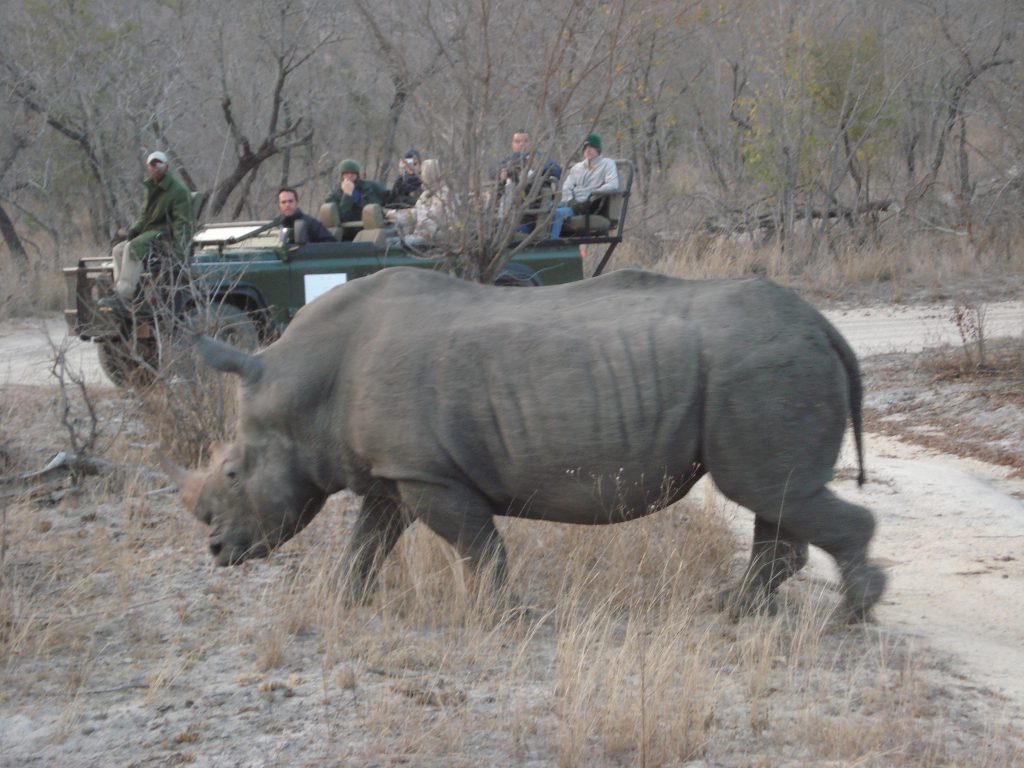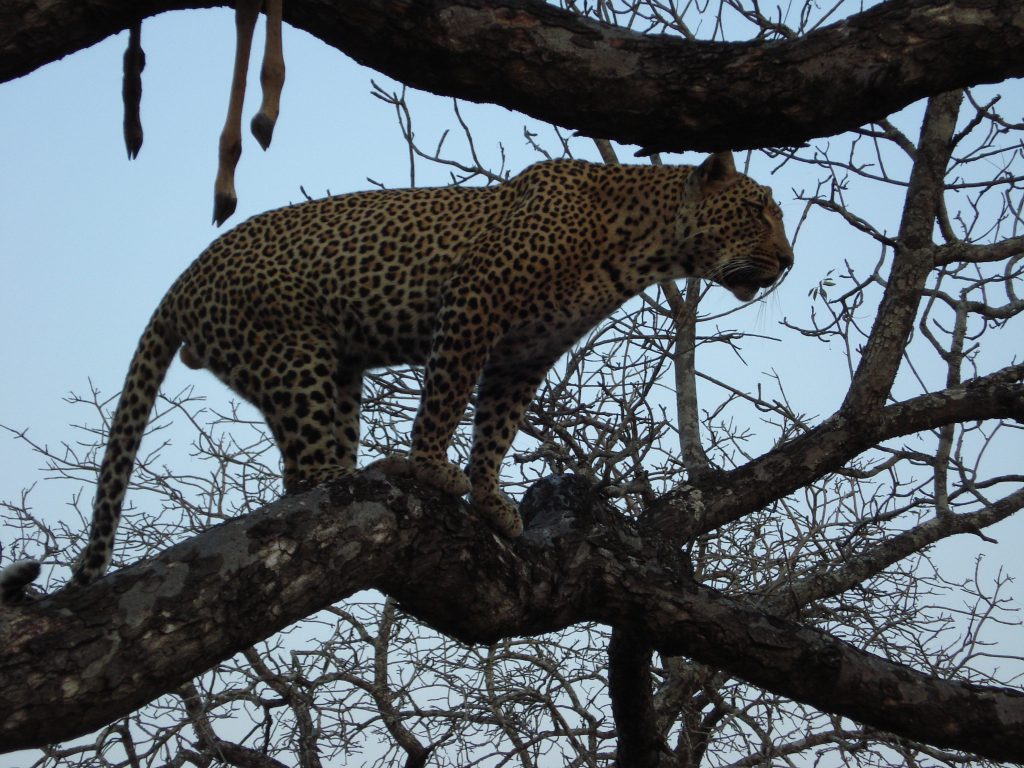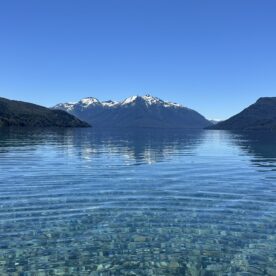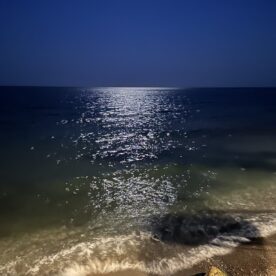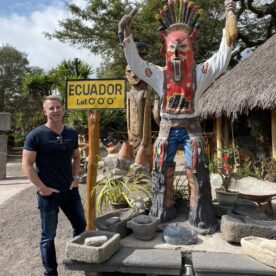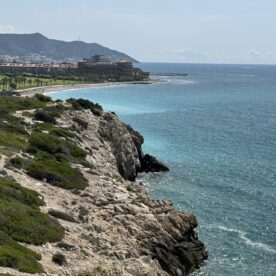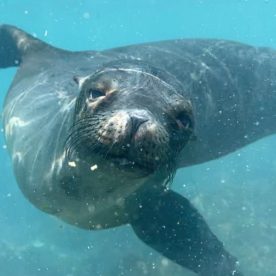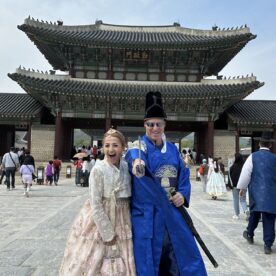What luck to have spotted it: a shiny metal street sign rising out of the arid African high desert. This had to be the right one but it was too far away to confirm and, at any rate, the sandy soil prevented me from pulling the compact car any closer.
Forced to walk, I stepped outside. Warren, ever ignoring my advice, followed. The dry and dusty conditions made it impossible to detect whether we were on either “Dixie” or “Utah”, the two street names marked by the weathered sign.
My relief at having found the meeting point suggested by the manager of the Lion Sands Lodge soon faded as I turned back towards the car. Greeting us were two lions.
Almost invisible in the dry bush, they lied there eyeing Warren and me intently. Their attention intensified when my mouth opened to warn Warren not to move. The sun was setting fast, our only working cell phone was in the car and help was still thirty minutes away.
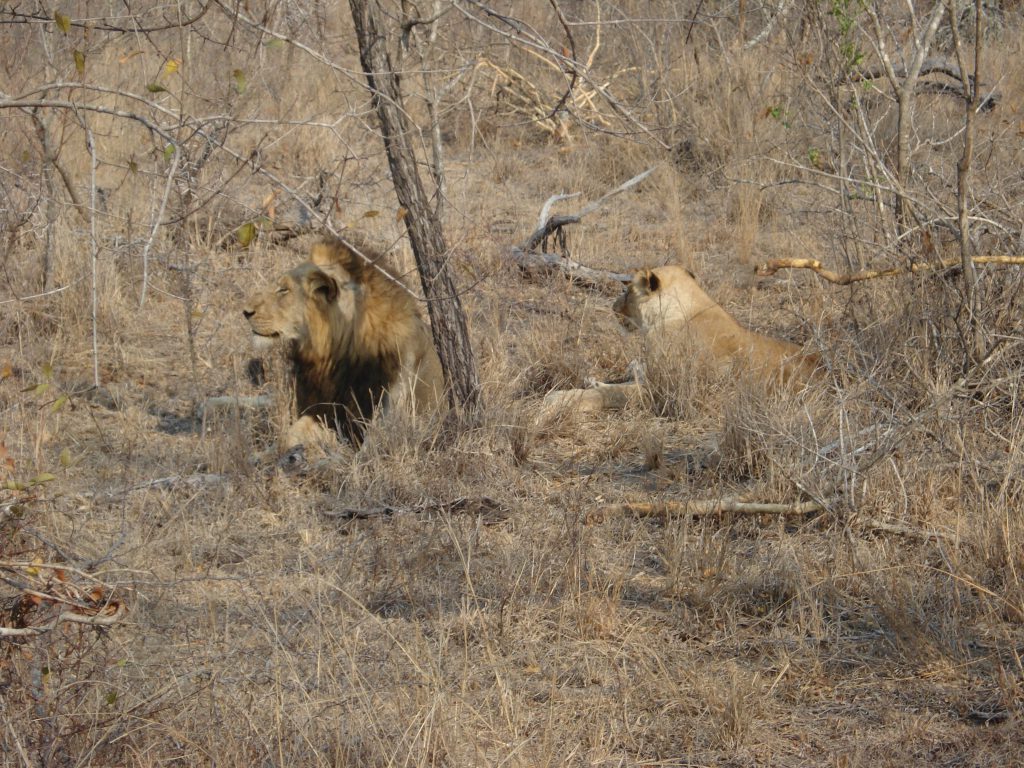
“Trust me”
My friend Warren phoned to say he wanted to visit me, prompting me to try and dissuade him. Having worked in Africa for a year at that point, I knew it was no place for Warren, who was better accustomed to the comforts of Washington D.C.’s Dupont Circle neighborhood. Besides, I didn’t relish the thought of playing servant, tour guide, and entertainer for three weeks.
Warren suffers attention deficit disorder, is agoraphobic, lacks a driver’s license, and hasn’t ever shown the slightest interest in nature. I tried to make him to realize an African safari might not be for everyone. But he insisted, “Since you’ve known me, I’ve always said I wanted to go on safari.”
Maybe he told other people. The only travel reference I recall hearing from Warren was a complaint after returning from a visit to London that he thought everything was old and the two-button toilets were complicated.
He assured me that his travel agent knew South Africa and the Kruger National Park like the back of her hand and dismissed my suggestion that the park was bigger and father from Johannesburg than had been described.
“Trust me; my travel agent said there were basically only two turns and the drive through the countryside would be lovely. We can get the safari out of the way on the first weekend I’m there then you can show me Johannesburg and Cape Town. We’ll have fun, you’ll see,” he pleaded. Warren spoke of the places as though they were several subway stops apart and not opposite corners of a very large country.
Yet I was due a vacation and hadn’t seen The Kruger, the crown jewel of African tourism and home of “The Big 5” deadliest animals on the planet.
“All right,” I relented. Besides, I owed him. Faithfully, each week over the last eight years, he took care of my house on Capitol Hill while I was living and working overseas.
Arrival
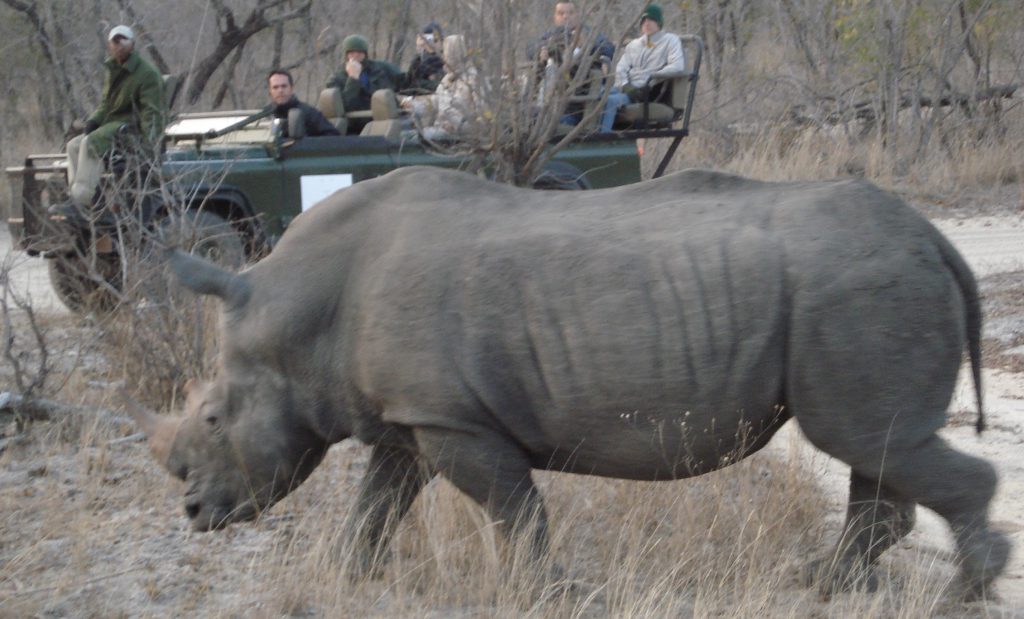
Warren travelled light. When I greeted him Friday night at Oliver Tambo Airport — named for an anti-apartheid leader, but to me sounded like a ’70s funk band — Warren exited customs carrying only one tiny suitcase. His tall, lanky and pale white frame was easy enough to spot. He appeared tired but genuinely excited. His clothes and bleached hair tips would have better suited his seventeen year old son, but he always tried to dress half his age. It took only a few steps into the cold winter night for him to realize he hadn’t prepared for the seasonal shift that crossing the equator brings.
Game drives in Africa begin before sunrise in open-top vehicles and end well after sunset. Winter days in Africa are warm, frequently reaching 80 degrees, but nights very cold, almost always near freezing.
Not that Warren had done any research. Warning him would have been sensible, but my project at work was in full swing, leaving barely enough time to prepare for the trip myself.
Final Plans
Warren cleaned up at my place then we dined at a steakhouse in Johannesburg’s trendy Melrose Arch district. We caught up, gossiped about friends, and finalized details for our big adventure. He had booked the safari so we reviewed the instructions from his travel agent.
When outlining to co-workers the plans during his visit, they were shocked to hear we were driving to the Kruger. Driving? According to them this was insanity. The preferred — in fact, the only — mode of transportation is to fly up in small, charter planes.
Relaying this back to Warren he would have none of that, instead declaring, “I want to see how the people live” His curiosity to understand if there is more to Africa than what Americans see on television would not be deterred.
The Travel Agent’s instructions were light on details but how hard could it be? Really … there aren’t that many intercity roadways on the continent, how far off the beaten path could we possibly get?
We finished the evening at my house over more wine and gossip then turned in early, excited for our trip. “We need to leave Johannesburg at eight o’clock sharp tomorrow morning if we’re going to make the afternoon game drive, so be ready by then,” I warned as the lights went out.
Leaving Los Africa (my nickname for Johannesburg)
Nearly four hours into the drive, we found ourselves smack in the middle of nowhere, the bustle of Johannesburg decidedly behind us. Approaching the tiny village of Nelspruit — the last town marked on the digital maps of “Lindi,” the nickname for my car’s know-it-all GPS device — I had the feeling we were no longer experiencing what Warren had deemed to be a “pleasant drive in the countryside.”
It was time for a quick conference and huddle over a map. Only problem: neither of us had thought to bring one. Nor had we brought the documentation for the lodge. In fact, neither of us had the faintest idea where the Lodge was or how far we were going into the park. A search within the rental car yielded a courtesy map that covered central Johannesburg. It would seem we were a bit ill prepared. We didn’t even have water, just two Kit Kats, a packet of potato chips, and four Diet Cokes.
Yet there was no need to panic. The towns we had already passed proved to be quaint tourist villages full of restaurants, gas stations, and supplies. Our only problem was: Lindi wasn’t showing any other towns for the remainder of the drive. I pulled over to top up the petrol to be safe.
While I filled up Warren checked his cell phone call list for the number of his travel agent. We got lucky. We phoned her to “reality check” our situation. Her response was slow — not because she was being precise, it seemed she was buying time.
“You’re heading to Nell Sprite?” she repeated, before announcing, to my great relief, “Oh, I see exactly where you are.” Then my confidence faded. “Wait,” she said, “did you say Nelspruit? No, no there you are. You need to definitely, definitely, definitely turn right to head towards the western park entrances.”
Lindi wanted us to turn left. But the Kruger was thousands of kilometres long and had dozens of entrances. I figured Lindi was pointing us to the Main Gate but obviously the agent was seeing a gate closer to our lodge. I turned right. Our travels came to an abrupt halt at a closed makeshift gate.
It’s the end of the world as we know it and I feel fine
A rudimentary sign indicated our route was under “intensive reconstruction”. A guard came out, motioning for us to stay put and telling us we just missed the cut-off. Apparently, only a single lane was open through the steep, 10-kilometer mountain pass. We had to wait forty minutes for the one-way traffic to clear.
Eventually the gate lifted and guard motioned for us to proceed. The road surface was decent for the initial ascent. Nelspruit grew smaller then disappeared in the rear-view mirror. Conditions changed at the peak. Ironically, my iPod started playing R.E.M.’s It’s the End of the World as We Know it and I Feel Fine. But I didn’t feel fine as I gazed at the conditions below.
For as far as we could see, the trail was barely wider than the compact car. To our left was a rocky, rough clearing where a road would eventually be. Inches to our right, and with no protective barriers, was a sheer cliff to a desolate valley more than 10 kilometers down. At its bottom: a smattering of burnt cars that hadn’t made it through. The only possible protection between us and the valley floor were a few sparse and parched trees clinging to the cliff side — not much help to break the fall of a plummeting Honda Fit. At least Warren didn’t have winter clothes or a map to further weigh down the car.
With no room for error, I sat upright and gripped the steering wheel with white knuckles. The car’s right-drive setup helped when judging the distance to the cliff’s edge. The tires still came dangerously close several times. The drive seemed an eternity and, in fact, took much longer than the opposing traffic did.
“Thank God we don’t have to do that again for several days” I said when through the pass. “I see a small town up ahead. Our resort must be very close.”
With the road widening and the two of us relaxing, Warren began cleaning the car in anticipation of handing it over to a valet. Except, he acted too soon.
“I didn’t think we were supposed to cross into Swaziland,” I said in my calmest voice — as we approached a heavily fortified international border crossing.
With the travel agent back on the line, she finally admitted she had no idea where we were. Warren struggled to get directions out of the border guards — “Sabi Sands Game Reserve … Lion Sands Luxury Lodge,” he stammered as an older British couple wandered over to help.
“Foreign travel agents aren’t always knowledgeable of Africa,” the elderly woman began politely. “They rarely have any idea how vast the countryside can be. Why aren’t you using your GPS?”
“I wasn’t sure it was working.”
“Where’s your lodge?”
“Sabi Sands, Near the Orpen Gate.”
“Oh my dear, you’re a ways off. Here let me show you.”
We could have kissed her. She dug into a Burberry travel bag and pulled out several maps. “From Johannesburg, you should have turned left in Nelspruit, and it looks like the Orpen Gate is about a four hour drive from there. Your GPS was right.”
She advised we phone the lodge and request the manager, who could give us the exact GPS coordinates.
“That part of The Kruger is very rough, and I’m afraid the digital maps they install on those units aren’t all that accurate that far into the wilderness,” she said with an air of confidence Warren and I lacked.
Wilderness? Scanning the map, I said there weren’t any towns between Nelspruit and our lodge.
“Oh, there are towns,” cautioned the woman. “Refugee camps mostly. Avoid stopping in them, they can be dangerous if you don’t know what you’re doing.” She thrust the map into my hands. “Please take it, I insist. We have plenty of maps and I would be most upset if we read about the two of you in tomorrow’s paper.”
Warren gave up trying to teach the guards English and joined our conversation. The couple highlighted the best route for us to follow. We thanked them and waved as they continued on.
“Did she say, ‘far up in the wilderness,’” Warren asked uncomfortably. Not wanting to upset him, I responded as casually as I could.
“It’ll be fine. We’ll miss the afternoon game drive but still make dinner. Can you find the phone number of the lodge?”
“The lodge? The one we’re staying at? I might not have the number with me.”
Of course not. Why would we have it here in the car when it could be back in the house with the instructions? Luckily it was a published number. Directory assistance patched us through.
You’re where?
“You’re where?” the lodge manager asked in disbelief.
I explained that we were turning around at the Swaziland border and heading back to Nelspruit. I then read the British couple’s instructions, town by town. The manager confirmed the suggested route.
“Listen, don’t stress,” he said. “You’re well on your way and you’ll be here in no time at all. I’m off to supervise a drive, if you have any further questions, phone back and ask for me.”
At some point after our wrong turn, Lindi stopped speaking. Ignoring her constant pleas to, “make a legal U-turn,” on the mountain pass cliff must have been more than her circuits could handle. For the remainder of the trip she fell into an eerie silence as though we were in a marital spat. All she would do is display our position as a little purple car hovering high above a map of Africa, like a UFO. Her silent treatment continued even weeks after the trip. Eventually I traded her in on a more capable model.
Lindi was the least of our problems, however. We were an hour in the wrong direction and had to return to Nelspruit through the dangerous single-lane mountain pass.
Time was against us and the return drive through the pass was worse. With the sun directly in our eyes and the cliff now on the opposite side of the car, the dangerous edge was far more difficult to calculate.
“Stop for a minute, I want to get a picture,” Warren all but demanded.
Are you kidding me, I thought — but obliged.
Without room to pull over, I simply stopped. He opened the door and, upon realizing there wasn’t enough room to get out and stand, began leaning precariously over the cliff. Though his seat belt was fastened, I instinctively reached over and dug my hand into the back pocket of his jeans.
A single click of the camera set off a loud and unearthly grunt. Warren, in a complete panic, started flailing about, trying to wrangle back into the car.
“Oh my God, oh my God!” he screamed repeatedly as I pulled hard on his jeans. Once in and, after a hasty slamming of the car door, he looked at me with wide eyes. “I thought there was some sort of rock in my way, but, it was, it was …”
“A baboon,” I finished without having seen the animal. “They live along steep hills like this and are fond of tourists, particularly those with food. Not that we really have to worry about that though. Did you get a good shot at least?”
He did, well sort of: three baboon knuckles, a patch of distant horizon and a blinding sun spot. At least, that was what had been in his camera before a monkey stole it from our lodge a few days later.
“The road is missing”
Leaving Nelspruit on the only road out of town we hadn’t already tried, the map and directions proved useful. Warren, however, growing bored from seven hours of driving, wanted a third confirmation. I again phoned the lodge.
“The first town you will pass through will be Hazyview, and then Acorn Hooke, then you’re basically there,” the manager said confirming what we already knew. “Keep an eye out for our signs towards the end of Acorn Hooke. And oh yeah, the road is missing for the last fifteen kilometers. So you’ll just have to drive on whatever surface your car can get through. After Acorn Hooke there are no more turns. So that’s about it. You’re about an hour away!” She put the phone down abruptly.
“Did she say the road was missing?” Warren asked, increasing his interest in our plight. “What are we in, a video game?”
“We’ll worry about it when we get there.”
I also wondered what she meant and how a road could be, “missing”. A road isn’t exactly like a set of car keys, or even a person. Did the residents forget where it was? If we find it should we tell someone?
Warren interrupted my contemplation as we entered the first town in our directions. “Oh my god, what is that?” he asked in disbelief as we crested another hill and gazed down into a city of small shacks.
At first glance, the tiny mud and grass houses blended together in a quilt of brown. With a clear blue sky above and heat radiating off them, the scene looked like an impressionist painting of a beach.
Later, the game drivers would explain the town of Hazyview has 4.5 million residents, refugees from nearby Zimbabwe. It lacks running water, electricity, and telephones. Only three grocery stores serve the city and deliveries to them were sporadic. The town collectively owns a handful of white vans that serve as transportation when government-supplied petrol is available. Life sounded hard there though we were told it was far better than where they had fled.
“This is another planet from Johannesburg,” Warren said, still in shock as yet another hill passed and the city continued.
The pace slowed, we now shared the road with herds of goats and cattle. Children were running up to the road’s edge to stare at our shiny new car. Trying not to stare back we continued on in silence when the phone interrupted our thoughts.
“Where are you?”
“I just wanted to check up on your progress. Where are you?” the lodge manager asked. Her tone suggested she was expecting us to be standing in front of her.
We explained we had just left Hazyview and we were coming up on Acorn Hooke. “Great, sounds like you’re only an hour away,” she said for the second time and quickly hung up.
The town of Acorn Hooke was easy enough to find. There was, after all, only one road through it — sufficiently foolproof even for us. Continuing through its only street as directed, there still weren’t signs yet for The Kruger, which seemed odd given its status as South Africa’s leading tourist destination. An undocumented fork in the road stopped us at the end of town.
“Didn’t the manager say there weren’t any more turns past Acorn Hooke?” Warren asked.
“She did. And I dont see anything on the map showing a fork”
I glanced at Lindi, we were still a purple UFO. Even our British maps lacked details for Acorn Hooke. One of the forks was secondary, we lacked experience with dirt roads to tell which one.
“I think at this point we’re supposed to be looking for a missing road,” I added dryly. We couldn’t continue without being certain. The sun was low and the distance between towns was hours not minutes. A mistake wouldn’t be corrected until well after dark. “I saw a pub a block back. Surely someone there would know.”
Pulling up in front of the bar, it occurred to me we were parking the only vehicle in town. The patrons immediately emptied. In fact, the whole town came out to stare at the car and us.
“Can anyone help us get to Sabi Sands Game Reserve?” I asked.
An older man came forward, looked over our car with bewilderment then spoke up, “Are you sure you want go in that?”
I explained our predicament … it was either Sabi Sands or Johannesburg.
After assurance I knew how to navigate country roads from my childhood in rural, Western Pennsylvania, he relented and instructed us to take the fork to the right. I offered him money, not knowing if I should. He refused so we returned to the car and were off again.
The Missing Road
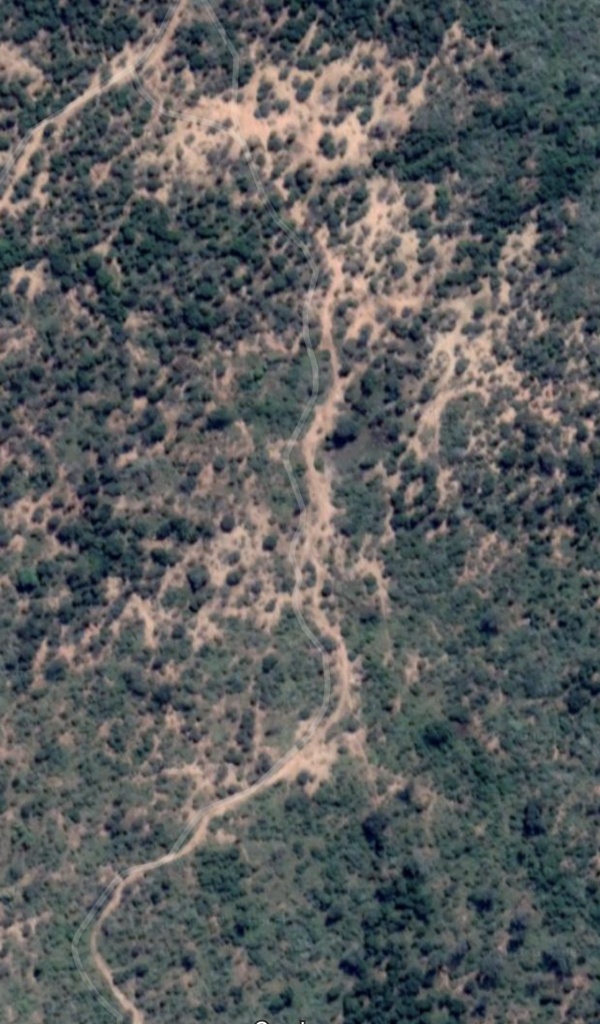
Several minutes past Acorn Hooke the meaning of “missing road” became startlingly clear.
“Where the hell are we supposed to drive?” Warren asked, beating me to the punch.
What little pavement existed beyond Acorn Hooke abruptly disappeared into the dry landscape. I couldn’t tell if a road once existed and was being reclaimed by nature, we accidentally steered into a riverbed, or the town simply stopped building the road when they realized no one within a 100 kilometer radius owned a car.
Getting out to assess the situation, I didn’t know what to look for. Maybe tire tracks would reveal a path?
At about the same time, we each noticed a series of deliberately placed rocks and tree branches. They were small and far apart. Rocks seemingly marked straight paths, tree branches turns. As long as we didn’t drive too fast, we’d probably be able to follow them.
As the sun set we increased our speed through the uncertain terrain. While straining to follow the markers and keep the tiny car from sliding off the dusty trail, the lodge manager phoned.
“Where are you now?” she wanted to know.
“We’re a little ways into the missing road,” I responded.
“How far into it?” she wanted to know but continued without waiting for our response, “By the way whatever you do, don’t get out …”
Warren interrupted her before she could finish. “Hey listen … could you please, please find someone who can meet us out here before it’s completely dark,” he pleaded. With the sun quickly disappearing his urgency was justified.
“Okay,” she said. “I’ll leave now and meet you. Try to find a street sign marking the intersection of Dixie and Utah. Those aren’t the real street names, the sign was put in as a joke but it’s pretty visible in the otherwise natural landscape. Stay there and I’ll come get you,” she added then hung up.
Warren responded, “Did she say, ‘Dixie and Utah?’ Can this day get any stranger?”
We laughed hard for the first time since Nelspruit and relaxed with the comfort that help was on the way. The sun was casting long shadows off anything vertical, which made the rudimentary road markers even harder to spot. Finding a street sign out here, however unnatural, was going to require an enormous stroke of luck. Or not.
“Whatever you do, don’t get out …”
Standing there at the base of the sign, engaged in a staring contest with two lions, I wish we hadn’t found it. Surely Warren felt the same. I didn’t bother to turn around and there was no point in trying to run. Whatever was going to happen was entirely up to the lions.
With their eyes fixed on us, they sat up. One licked her paw, I hoped not as a pre-dinner ritual. I glanced over to Warren who looked as though he was about to make a run for it.
“Don’t move,” I warned again, more sternly this time.
“What do we do?”
“I don’t know. Just don’t move. I’m told they’re wary of people but also opportunistic if they sense fear.”
The cats seemed to be waking up — they hunt nocturnally after all. If only we had arrived on time. They stood up and stretched. My heart froze, breathing slowed. Warren took a step back, I thought he might faint.
They looked at us as if amused then yawned and slowly walked towards a patch of tall grass. My eyes followed the cats, their casual attitude remarkable, calm movement mesmerizing. They glanced back at the two of us, I couldn’t tell if they were inviting us to follow or ensuring we didn’t.
“I think it’s okay,” I said with a deep sigh as I turned to Warren.
But he was already back in the Honda.
